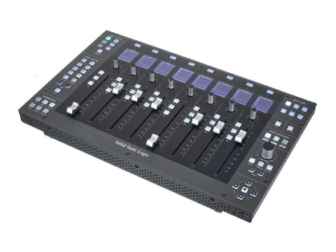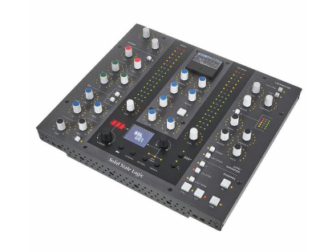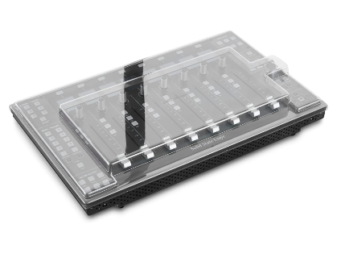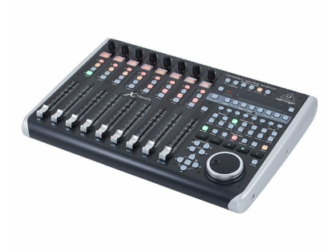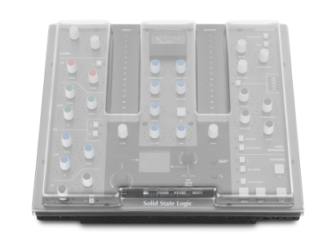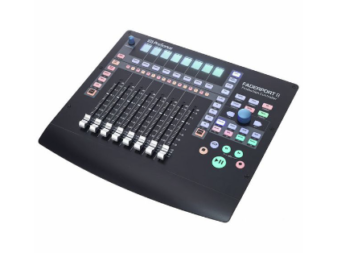SSL UF8 Fader controller to level up?
Solid State Logic’s recent acquisition of Harrison Mixbus was an interesting decision. We speculate whether this hints at new things to come for the highly revered UF8 Fader Controller.
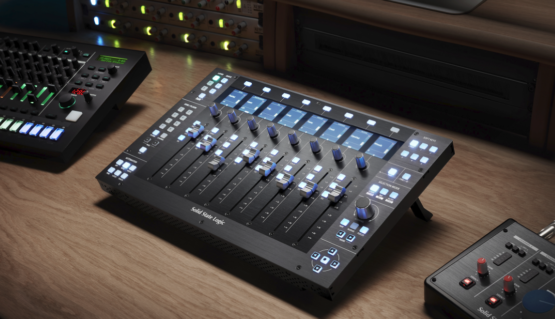
The SSL UF8 was launched in 2021 to critical acclaim, lauded for it’s feature-rich implementation across multiple DAWs and quality construction that we’ve come to expect of the brand over the years.
The UF8 features: 8 touch-sensitive motorised faders, 8 endless rotary push encoders, 8 TFT LCD colour displays and custom workflows via 43 assignable keys. At launch, the UF8 fully supported many of the big name DAWs via its included software SSL 360° and this has since expanded to include: Pro Tools, Logic Pro, Cubase/Nuendo, Live, Studio One, LUNA and Pyramix.
Other DAWs such as Reaper, Bitwig, Sequoia and Samplitude can also be operated using MCU or HUI protocols, though don’t feature an official profile, so there may be limitations to how the UF8 operates in these DAWs.
New Dog, Old Tricks
These same protocols, MCU (Mackie Control Universal) and HUI (Human User Interface), underpin the interfacing between the SSL UF8 and all the aforementioned DAWs. The advantage of using these protocols of course, is that they are widely adopted, allowing a product like the UF8 to seamlessly switch between DAWs at the touch of a button.
That said, these protocols were developed in an era when DAWs weren’t as capable as their modern day equivalents and the needs of a fader controller have outgrown their feature set. The HUI protocol was first developed by Mackie and Digidesign in 1997 and is fast becoming obsolete, having been superseded by Avid’s proprietary EuCON protocol, which has been implemented natively in Pro Tools since version 9 in 2010. The major obvious limitations of HUI in every day use pertain to the character count on the UF8 LCD displays - only 4 permissible - and the access to inserts/sends, which are limited to 4 and 5 respectively.
The MCU protocol, while being less ancient, technologically speaking, was developed in 2003 and seems to fare better. Controlling of inserts/sends are not as limited which is a problem with HUI/Pro Tools, though the resolution of the fader movement doesn’t seem to be quite as fine as the HUI protocol. All things considered, the folks at SSL have done a fantastic job with the UF8 and its interfacing across so many DAWs, and the UF8 ranks as the #1 DAW-Controller above 1000EUR at Thomann, which speaks volumes for SSL’s effort to create a seamless controller across multiple platforms.
New Frontiers
In April of 2023, it was announced that Harrison, manufacturer of the TRION Digital Console and acclaimed Mixbus Audio Workstations, had joined forces with Solid State Logic under the Audiotonix family of products. The main notable advantage of a decision like this of course being that Audiotonix are able to incorporate the collective brainpower and resources of multiple reputable companies, furthering the development and advancement of products within their range as well as future products. It is on this basis that we can only speculate what might come of the UF8, but it won’t stop us from doing just that.
Ch-ch-ch-changes!
So where does SSL go from here? They do in theory have their own feature rich and highly respected DAW at their disposal. One of the more obvious, yet time-consuming routes would be recoding various elements of Mixbus32C’s GUI to feature fully native integration of the SSL UF8, linking all buttons/encoders/faders seamlessly. Mixbus32C could then be bundled free or heavily discounted with the UF8, UC1, or even the SSL 12/2/2+ interfaces - much like Universal Audio do with LUNA and their interfaces.
Another more laborious yet infinitely more rewarding route would be for SSL to implement a new control surface protocol that expands upon the features of MCU. This would allow SSL to showcase the entire feature set of the UF8 - without limitation - initially on their own Mixbus32C platform, before expanding to all other DAW platforms (likely excluding Pro Tools) once the finer points and bugs have been ironed out.
Given the wealth of experience and knowledge at SSL, one can only assume it is within their range of capabilities and would help keep the music technology scene abreast of the current trends and free from the licensing barriers associated with proprietary protocols.
No matter what SSL opt for, we await with bated breath.
FEATURED AND ALTERNATIVES IN THE PRICE RANGE
